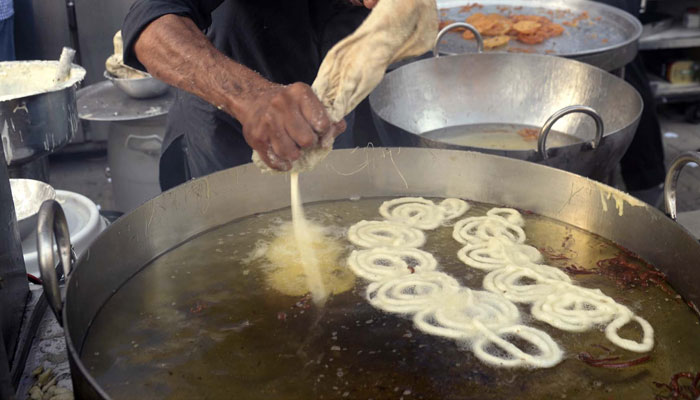Use of reheated oil may cause heart disease and cancers
Islamabad: The consumption of food items prepared in again and again reheated oil may expose one to high levels of toxic aldehydes, chemicals known to cause neurodegenerative diseases and cancer while the trans fats produced in the reheated oils increase the risk of heart attacks, stroke, type 2 diabetes and have an unhealthy effect on cholesterol levels.
Studies show that even some popular cooking oils including canola, corn, soybean and sunflower oils generate high levels of fatty acid-derived toxin called 4-hydroxy-trans-2-nonenal (HNE) when heated and reheated again and again. The consumption of foods containing HNE has been associated with increased risks of cardiovascular disease, stroke, Parkinson’s disease, Alzheimer’s disease, Huntington's disease, various liver disorders, and cancer. Once absorbed in the body, HNE reacts with DNA, RNA and proteins affecting basic cellular processes.
Research has shown that high amounts of the toxin also accumulate in cooking oils that are heated or reheated for hours at a time. Some aldehydes generated through reheating of oil dissipate after being produced in cooked oil though many others linger and accumulate and upon consumption, these toxins then react with human proteins, enzymes, and hormones, which can lead to serious health problems.
According to many health experts, even the best quality of edible oil when heated several times releases toxic aldehydes and the more times the oil is reheated, the concentrations of the toxic chemicals become worse. ‘Iftar’ dishes like ‘pakoras’, samosas, ‘kachoris’, ‘jalebis’ etc. fried in again and again reheated oil can be a risk factor for heart disease, breast cancer and prostate along with a number of other health threats.
Trans fat raises Low Density Lipoproteins (LDL) termed as bad cholesterol and lowers your High Density Lipoproteins (HDL), the good cholesterol. A high LDL cholesterol level in combination with a low HDL cholesterol level increases the risk of heart disease. Women having the highest blood levels of trans fats have twice the risk of breast cancer as compared to the women with low levels. Trans fats also increase the risk of prostate cancer in men who have higher blood levels of certain trans fats.
Experts say that for safety and quality, use fresh cooking oil each time you fry however, if you deep-fry large amounts of food frequently, it may not be practical from an economic standpoint. By straining, handling and storing the used oil properly, one can reuse it particularly if it is not overheated on the first use. Once the oil smokes, it is not safe for reuse.
When using oil with reuse in mind, experts say that as soon as oil cools enough to handle, strain it through layers of cheesecloth or paper towels or any filters to remove food particles. Store it in a clean glass jar. Never mix it with unused oil. Seal the jar tightly, label it with the date, and refrigerate or freeze for no longer than a month. It may become cloudy in the refrigerator or freezer, but will clear at room temperature.
-
 Therapist Killed In Office As Former Client Launches Knife Attack
Therapist Killed In Office As Former Client Launches Knife Attack -
 Gaten Matarazzo Brands 'Stranger Things' Final Scene 'nerve-racking'
Gaten Matarazzo Brands 'Stranger Things' Final Scene 'nerve-racking' -
 David Beckham Speaks Out After Son Brooklyn Beckham's Shocking Post
David Beckham Speaks Out After Son Brooklyn Beckham's Shocking Post -
 Sophie Turner Gets Candid About 'imposter Sydrome' Post 'GOT'
Sophie Turner Gets Candid About 'imposter Sydrome' Post 'GOT' -
 When Nicola Peltz's Boyfriend Anwar Hadid Found Solace In Dua Lipa's Arms
When Nicola Peltz's Boyfriend Anwar Hadid Found Solace In Dua Lipa's Arms -
 Claire Foy Reveals Rare Impact Of 'The Crown' Gig On Career
Claire Foy Reveals Rare Impact Of 'The Crown' Gig On Career -
 Megan Thee Stallion Teases New Music On The Way
Megan Thee Stallion Teases New Music On The Way -
 Blonde Kate Stuns In Photos With Prince William During Rare Joint Engagement
Blonde Kate Stuns In Photos With Prince William During Rare Joint Engagement -
 Kate Gosselin Reveals Harrowing Moment Thief Nearly Took Her Down
Kate Gosselin Reveals Harrowing Moment Thief Nearly Took Her Down -
 Billy Bob Thornton Weighs In On Contrast To 'Landman' Role
Billy Bob Thornton Weighs In On Contrast To 'Landman' Role -
 Amanda Holden May Swap Position To Different Reality Show: See Which
Amanda Holden May Swap Position To Different Reality Show: See Which -
 The Truth Behind Victoria Beckham's 'inappropriate' Wedding Dance Video
The Truth Behind Victoria Beckham's 'inappropriate' Wedding Dance Video -
 AI Startup Raises $480 Million At $4.5 Billion Valuation In Earlier Gains
AI Startup Raises $480 Million At $4.5 Billion Valuation In Earlier Gains -
 North Carolina Woman Accused Of Serving Victims With Poisoned Drinks
North Carolina Woman Accused Of Serving Victims With Poisoned Drinks -
 Robert Redford’s Daughter Amy Sings Praises Of Late Father
Robert Redford’s Daughter Amy Sings Praises Of Late Father -
 OpenAI And ServiceNow Team Up To Embed ChatGPT In Business Workflows
OpenAI And ServiceNow Team Up To Embed ChatGPT In Business Workflows




